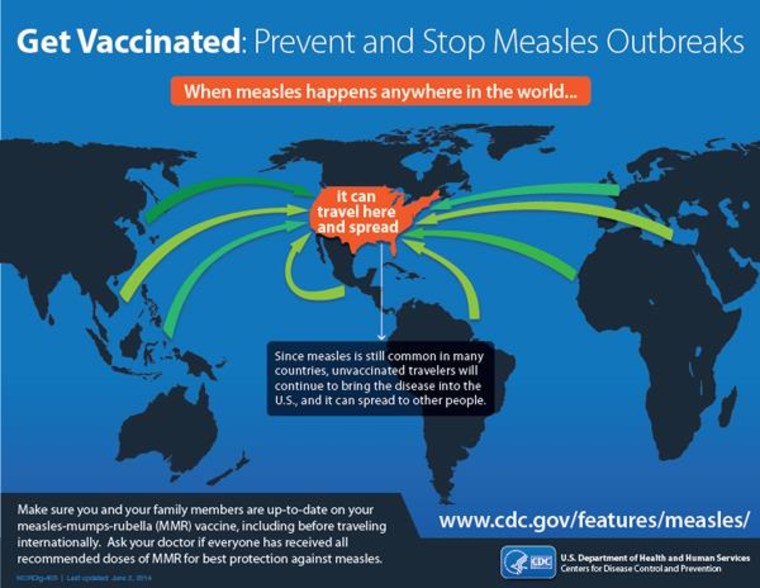Nearly 9 million U.S. children are not fully vaccinated against measles and risk getting infected, researchers say in a new report. And unvaccinated U.S. travelers could carry the virus back home with them to infect others.
Two reports released at a meeting of infectious disease experts this week measure the gaps in measles vaccine coverage and show how an outbreak like the Disneyland outbreak, in which around 150 people got infected, can happen.
"If the virus is introduced, there is the potential for large outbreaks," said Robert Bednarczyk of Emory University, who led the work on the study.
"This is because there are clusters of unvaccinated children in some communities, which could allow a large outbreak to occur with spread to similar communities.”
“If the virus is introduced, there is the potential for large outbreaks."
Bednarczyk and colleagues used the National Immunization Survey to calculate that 12.5 percent of all U.S. children, or 8.7 million kids, are either unvaccinated or not fully vaccinated against measles. Almost a quarter of kids 3 years old or younger are undervaccinated, they found.
Children are supposed to get two doses of the combined measles, mumps and rubella (MMR) vaccine.
Measles vaccinations have been in the headlines because of an outbreak linked to Disneyland that infected 147 Americans. It shed light on a small but heated controversy over vaccinating children. Health experts say pockets of well-to-do vaccine doubters can help fuel outbreaks when they delay vaccination or refuse to vaccinate their kids at all.
"We know some parents have concerns about vaccines and may want to avoid or delay vaccination, or follow an alternative schedule than the one recommended because they’re concerned about the safety of the vaccine," Bednarczyk said. "In fact, the vaccine is very safe, while not vaccinating is highly risky, leaving their children — and others — vulnerable to a serious illness that can cause a large number of complications."
So far this year, the Centers for Disease Control and Prevention reports that there have been 189 U.S. measles cases, including one death — a woman in Washington state.
Measles was eliminated in the U.S. in 2000, but a few imported cases come in every year. These can spread if people are not fully immunized. Globally, there are around 20 million cases and more than 145,000 children die of measles every year.
“The more people within the U.S., especially children, who are not vaccinated against measles, the more risks we run for spread."
Travelers from other countries can carry measles to the U.S. and Dr. Emily Hyle of Massachusetts General Hospital and colleagues ran an experiment to see if travelers are aware of and prepared for the risk of infection.
More than half the known U.S. importations of measles come not from foreign visitors, but from unvaccinated or undervaccinated U.S. travelers bringing the virus back, she told the Infectious Disease Week meeting, being held in San Diego.
Related: So What's Actually in a Measles Vaccine?
Her team surveyed records of 40,000 adult travelers who visited travel clinics. "We found that 16 percent had insufficient evidence of measles immunity," she told reporters.
Many may not realize that measles is far more common even in western European countries than it is in the U.S. And doctors may not think to remind patients that measles is a vaccine that a traveler might want to get.

"Measles is one of the most contagious diseases in the world and even brief exposure can lead to infection," Hyle added.
Hyle said she was concerned to learn just how many undervaccinated children there are in the U.S.
"The more people within the U.S., especially children, who are not vaccinated against measles, the more risks we run for spread," she said.
